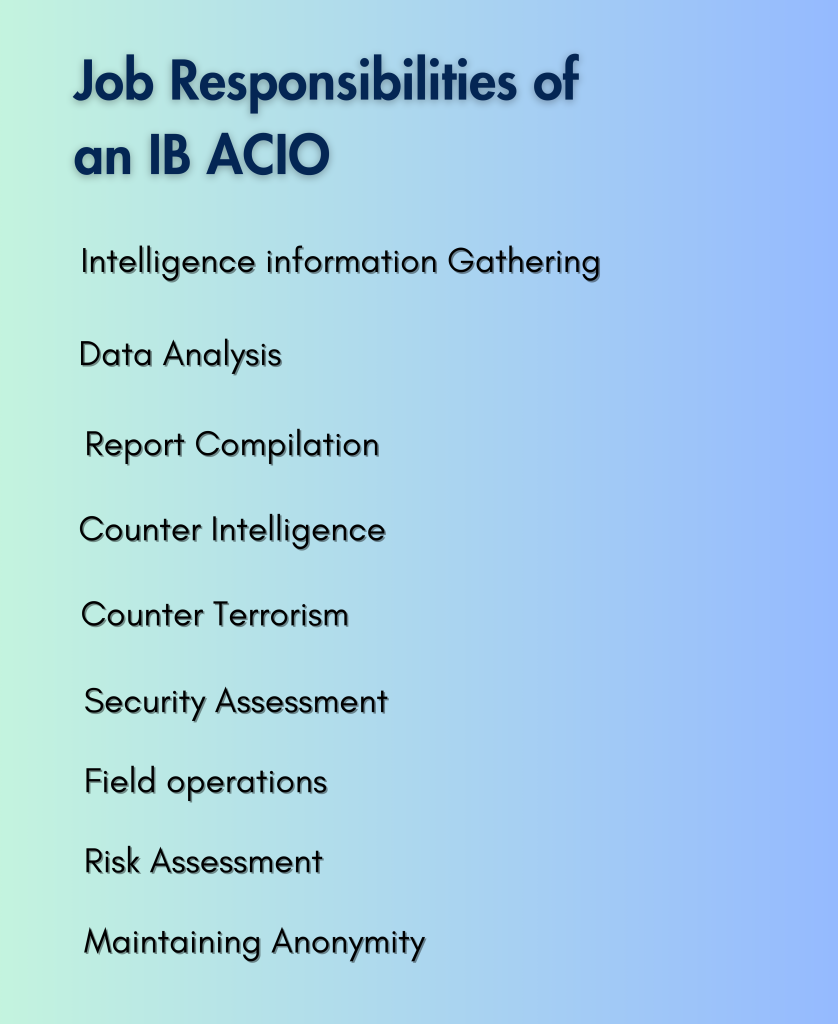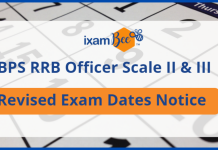The IB, or Intelligence Bureau, is one of the oldest and essential pillars of India’s internal security. This organization works to resolve the potential security threats within the country. Therefore, the people working under this organization play a significant role in the security of every country’s citizen. The organization comes under and is managed by the Ministry of Home Affairs. The employees under this organisation do not come under any Army or other border security body. The significant difference between IB and other defense bodies is that IB entirely focuses on the internal security of the country, whereas other defense bodies look after international threats and other border securities.
Every year, the IB or Intelligence Bureau releases its notification for various posts, including the ACIO (Assistant Central Intelligence Officer). This year, the IB released its notification on November 21st, 2023. Working as an IB employee is no less than a matter of prestige. Aspirants are keen to work with the intelligence agencies closely. It is believed that being an IB official, you are supposed to work behind the curtains. Due to this, many aspirants willing to work with an intelligence organization have many questions about the job profile and work environment of this organization. This blog is an introductory guide to IB’s history, significance, and other details, especially the ACIO profile. So, if you want to know details about the Intelligence Bureau or how it works, keep reading this blog until the end.

Importance of IB in India’s Internal Security
IB is the central pillar of maintaining peace within the nation by resolving and taking disciplinary action against potential threats to the safety and prosperity of India. IB collects data and inputs from suspicious activities, if any, and hands it to the state and federal authorities. After that, the federal and other regulatory agencies take action accordingly. This means IB works in detecting the root threats that may harm the nation’s prosperity. In other words, IB’s dedicated personnel work tirelessly behind the scenes to gather critical information, analyze intelligence, and provide actionable insights to national decision-makers and law enforcement agencies. Their efforts are instrumental in preventing terrorist activities, countering espionage, and ensuring the overall safety and well-being of Indian citizens.
Distinction Between IB and Other Defense Bodies
The Intelligence Bureau (IB) stands apart from other defence bodies in its primary focus on India’s internal security. While armed forces and border security agencies concentrate on defending the nation’s borders and countering external threats, the IB addresses domestic security concerns. Refer to the table below for how the IB differs from other defense bodies.
| Aspect | Intelligence Bureau (IB) | Other Defense Bodies |
| Primary Focus | Internal Security | External Defense |
| Core Responsibility | Addressing domestic security concerns | Safeguarding national borders |
| Key Functions | Gathering intelligence on internal issues such as terrorism, espionage, and civil unrest | Defending against external threats, including military aggression |
| Reporting Authority | Ministry of Home Affairs | Ministry of Defense |
| Geographic Focus | Nationwide | Border regions and international boundaries |
| Interaction with International Agencies | Limited | Extensive |
| Primary Stakeholders | Law enforcement agencies, government decision-makers, and citizens | Military personnel, border security forces, and border populations |
| Operations Secrecy | High | High |
| Role in Citizen Safety | Ensures safety within the country | Protects national sovereignty at borders |
| Deployment | Predominantly within India | Primarily at borders and international regions |
History of the IB (Intelligence Bureau)
Let’s take a brief look at the history of the esteemed Indian Intelligence Bureau from its establishment in 1887 to its journey till Indian Independence:
- Establishment of Central Special Branch (23 December 1887): Established on 23 December 1887, the Intelligence Bureau (IB) holds the distinction of being the oldest organization of its kind globally. Initially founded as the Central Special Branch, its inception marked a significant milestone in the history of intelligence agencies.
- Transformation into Indian Political Intelligence (1921): In 1921, a few years after its establishment, the Intelligence Bureau underwent a transformation and was rebranded as the Indian Political Intelligence (IPI). During this period, the IB functioned as a surveillance and monitoring agency jointly operated under the India Office and the Government of India.
- Role Until the Formation of RAW (1968): Up until the Research and Analysis Wing (RAW) was established in 1968, the Intelligence Bureau was pivotal in handling domestic and foreign intelligence inputs. It was the primary agency responsible for gathering and analyzing intelligence information during this period.
- Post-Independence Renaming (1947): With the dawn of Indian Independence in 1947, the Indian Political Intelligence (IPI) underwent a significant change in nomenclature. It was renamed as the Intelligence Bureau of India and came under the administrative purview of the Ministry of Home Affairs. This renaming marked a crucial phase in the evolution of the intelligence landscape in post-independence India.
The Role of the Intelligence Bureau in India

The Intelligence Bureau (IB) is like the country’s secret guardian, gathering valuable information to keep our nation safe. IB agents work behind the scenes, collecting intelligence on various matters of concern, like terrorism, espionage, and internal security threats. The Assistant Central Intelligence Officer (ACIO) is an essential position within the IB. ACIOs are the unsung heroes who analyze data, investigate leads, and help the IB make informed decisions. They’re like the detective minds of the bureau, working tirelessly to ensure the safety and security of India. It’s a challenging job that greatly protects our nation’s interests.
The IB ACIO: Job Profile
The Intelligence Bureau Assistant Central Intelligence Officer (IB ACIO) is vital in India’s intelligence and security framework. ACIOs serve as the eyes and ears of the Intelligence Bureau, responsible for gathering, analyzing, and disseminating crucial intelligence information. They play a pivotal role in national security, actively in espionage prevention, counterterrorism, and data analysis. ACIOs operate covertly, often conducting fieldwork and collaborating with various agencies to ensure the safety and well-being of the nation. This role demands a keen intellect, discretion, and unwavering dedication to protecting India’s interests, making IB ACIOs indispensable in safeguarding the nation’s security.
Job Responsibilities of an IB ACIO
Here are the key responsibilities of an Intelligence Bureau (IB) Assistant Central Intelligence Officer (ACIO) in India. Unlike the portrayal of an intelligence officer in popular culture, the role is not always risky and not as high-risk:
- Information Collection Techniques: ACIOs (Assistant Central Intelligence Officers) are entrusted with the responsibility of gathering crucial information using various methods, including human intelligence, surveillance, and open-source research. These diverse techniques enable them to understand potential threats to national security comprehensively.
- Data Analysis and Threat Identification: Upon collecting information, ACIOs diligently analyze the data to identify trends, patterns, and potential threats to national security. This analytical process is integral to their role, providing timely and accurate assessments that inform higher authorities and policymakers.
- Counterintelligence and Counterterrorism Activities: ACIOs actively identify and counter-espionage activities, both foreign and domestic, aiming to protect sensitive information. Additionally, they play a crucial role in monitoring and investigating potential terrorist threats, contributing to efforts to prevent acts of terrorism on Indian soil.
- Collaboration and Risk Assessment: ACIOs maintain collaborative relationships with other law enforcement agencies, government departments, and intelligence agencies. They share information and coordinate efforts to address security challenges. Furthermore, ACIOs assess the risk levels associated with various individuals and organizations, aiding in prioritizing security measures to mitigate potential threats.
Recruitment of IB ACIO
Recruitment for the IB Assistant Central Intelligence Officer (ACIO) post is conducted by the Union Ministry of Home Affairs, Government of India. It typically involves a rigorous selection process that includes a written examination followed by an interview. Candidates must meet specific eligibility criteria for the IB ACIO Exam. The written exam assesses candidates’ knowledge of general awareness, reasoning, quantitative aptitude, and English language skills. Successful candidates are then invited for an interview, where their suitability for the role is further evaluated. Aspirants interested in a career as an IB ACIO should regularly check the official website of the Ministry of Home Affairs for recruitment notifications and updates.
The Selection Process of IB ACIO.
The selection procedure for the Intelligence Bureau Assistant Central Intelligence Officer (IB ACIO) post involves a multi-stage process to ensure the recruitment of highly capable candidates. Here’s a brief overview of the selection procedure:
- Written Examination: Candidates must first appear for a written examination that assesses their general awareness, reasoning, quantitative aptitude, and English language skills. The written test typically consists of multiple-choice questions and descriptive papers.
- Interview: Successful candidates from the written examination are invited for an interview. Their suitability for the role is evaluated during the interview, and their problem-solving, analytical thinking, and communication abilities are assessed.
- Document Verification: Following the interview, candidates undergo a document verification process to confirm their eligibility and authenticity of the information provided in their application, ensuring a thorough and transparent evaluation of their qualifications and background.
- Medical Examination: After all this is done comes the medical examination. Shortlisted candidates may need to pass a medical examination to meet the required physical and medical standards.
- Final Selection: The final selection is based on the combined performance in the written examination and interview. Merit lists are prepared, and candidates are offered appointments based on ranking.
IB ACIO Exam Pattern
The IB ACIO Exam 2023 will encompass three phases. As per the IB ACIO Recruitment 2023-24, successful candidates are obligated to serve anywhere in India, as stipulated in the official notification. The IB ACIO Selection Process includes the Tier 1 examination with five sections: Current Affairs, Numerical Aptitude, Reasoning/Logical Aptitude, English Language, and General Studies. With a total duration of 1 hour and no specified sectional timing, candidates are advised to maximize attempts while maintaining accuracy for optimal performance.
The IB ACIO Tier 2 Exam adopts a descriptive format, where candidates compose Essays, undertake English Comprehension, and engage in Precis writing within one hour, collectively accounting for 50 marks. This examination structure evaluates candidates’ language proficiency and communication aptitude by comprehensively assessing their writing and comprehension skills. The IB ACIO Exam Pattern 2023 is given below:
| IB ACIO Tier 1 Exam Pattern | |||
| Name of test | No. of questions | Maximum marks | Duration |
| General Awareness | 20 Questions | 20 | 1 Hour |
| Quantitative Aptitude | 20 Questions | 20 | |
| Reasoning | 20 Questions | 20 | |
| English language | 20 Questions | 20 | |
| General Studies | 20 Questions | 20 | |
| Total | 100 Questions | 100 Marks | |
| IB ACIO Tier 2 Exam Pattern | |||
| Name of test | No. of questions | Maximum marks | Duration |
| Essay | 1 Question | 30 Marks | 1 Hour |
| English Comprehension & Precise Writing | 2 Questions | 20 Marks | |
| Total | 3 Questions | 50 Marks | |
IB ACIO Exam Syllabus
In the initial phase of the IB ACIO selection process, the Tier 1 examination encompasses a broad spectrum of topics. To enhance preparation, it is crucial to pinpoint specific areas requiring focused attention within each subject, ensuring a comprehensive understanding of content and the unique criteria associated with each. This strategic approach is vital for effectively navigating the complexities of the examination and securing a successful performance. Moving on to the IB ACIO Tier 2 Exam, employs a descriptive format, requiring candidates to craft Essays, participate in English Comprehension, and undertake Precis writing. This segment evaluates candidates’ written communication and comprehension skills proficiency, contributing to a holistic assessment of their language aptitude and expressive capabilities. Refer to the table below for a detailed overview of the IB ACIO Tier 2 exam syllabus.
| Sections | Topics |
| General Awareness and General Studies | History, Physics, Chemistry, Biology, Current Affairs, Science & Technology, Static GK, Indian Polity & Constitution, Economy & Finance, Geography |
| Quantitative Aptitude | Number systems, Percentages, Mensuration, Ration and Time, Averages, Profit and loss, Fundamental Arithmetical Operations, Computation of whole numbers, Use of tables and graphs, Decimals, Relationship between numbers, Operations Research & Linear Programming, Differential Geometry, Dynamics, Essential Mathematics, Calculus, Real Analysis, Fundamental Arithmetical Operations, Computation of Whole numbers, Time and Distance, Ration and Proportion, Interest, Discount, Algebra, Differential Equations, Statistics, Time and Work, Fractions, Analytical Geometry, Statistics, LCM and HCF, Ratios, Percentage, Factoring, Age, Profit and Loss, Missing Numbers, Average, Prices and Expenditure Problems, Simple and Compound Interest, Time and Work, Mensuration, Volume, Time and Distance, Fractions, Series Completion |
| Reasoning | Alphanumeric series, Reasoning Analogies, Artificial Language, Blood Relations, Calendars, Cause and Effect, Clocks, Coding-Decoding, Data Sufficiency, Decision Making, Directions, Input-Output, Odd One Out, Puzzles, Order & Ranking, Statement and Assumptions, Statement and Conclusions |
| English language (for tier 1 and 2) | Grammar, Spellings Correction, One Word Substitution, Improvement Verbal, Comprehension Passage, Adjectives, Detecting Mis-spelt words, Idioms and Phrases, Passage, Verbs, Clauses, Fill in the blanks, Spot the error, Synonyms/Antonyms, Vocabulary, Sentence Structure, Essay, Precis Writing, English comprehension |
Tips to Preparing for the IB ACIO Recruitment
Here are some means of preparing for the IB ACIO Exam:
- Comprehensive Preparation Approach: Cracking the IB ACIO Exam demands an all-encompassing preparation strategy, encompassing both mental and physical fitness. The unique selection process of the IB emphasizes written test performance and evaluates candidates’ overall well-being. A solid grasp of the IB ACIO syllabus and exam pattern is also crucial for adequate preparation. It provides the foundational knowledge needed to navigate the exam.
- Utilizing Previous Year Papers: Leveraging ixambee’s IB ACIO previous year papers is a valuable starting point for the written phase. These papers offer insights into the exam’s structure and the nature of questions, allowing candidates to tailor their preparation accordingly.
- Mock Tests for Exam Simulation: Engaging in ixambee’s IB ACIO free mock tests replicates the exam environment, aiding in honing speed and accuracy. This practice familiarizes candidates with the exam conditions and develops the skills essential for success in the test.
- Seeking Guidance through Online Courses: Enrolling in ixambee’s IB ACIO online course will be beneficial for in-depth conceptual understanding and personalized mentorship. Expert guidance can significantly enhance preparation and increase the likelihood of success.
- Staying Updated on Current Affairs: A robust knowledge of current affairs is instrumental in increasing the likelihood of success in the IB ACIO Exam. Regularly staying informed about current events with Beepedia will aid in the written test and the interview phase of the selection process.
- Prioritizing Health and Fitness: Recognizing the importance of mental and physical health is crucial. Candidates must maintain a healthy lifestyle as medical criteria during the checkup phase could impact qualification. Paying attention to diet and overall well-being is essential to a successful IB ACIO Exam journey.
Summing Up
Let the remarkable commitment of the Intelligence Bureau (IB) and its steadfast Assistant Central Intelligence Officers (ACIOs) motivate aspiring candidates. Becoming an ACIO may be demanding, but it carries profound purpose and significance. Your dedication to safeguarding our nation’s internal security is a noble calling, contributing to the well-being of India and its citizens. Success in the IB ACIO exam demands knowledge, mental and physical fitness, unyielding determination, and the resilience to surmount challenges.
To help you prepare 50% faster for competitive exams, ixamBee provides a free Mock Test Series and all the Current Affairs in English and Current Affairs in Hindi in the BeePedia capsules for GA Preparation. You can also get the latest updates for Bank PO, Bank Clerk, SSC, RBI Grade B, NABARD, and Other Government Jobs.
ALSO READ
7 Reasons Not to Miss SBI Clerk Exams
Facts about SEBI: Full form and Details












